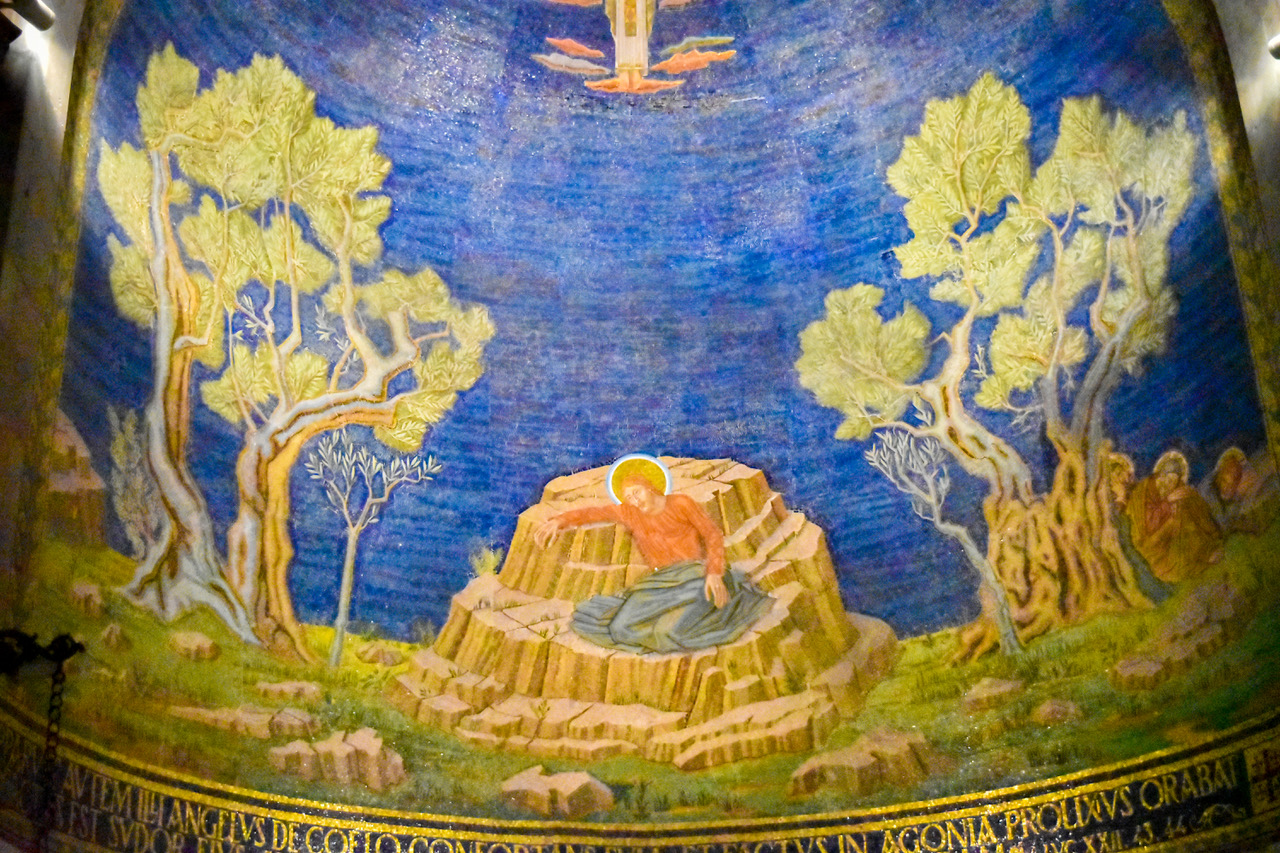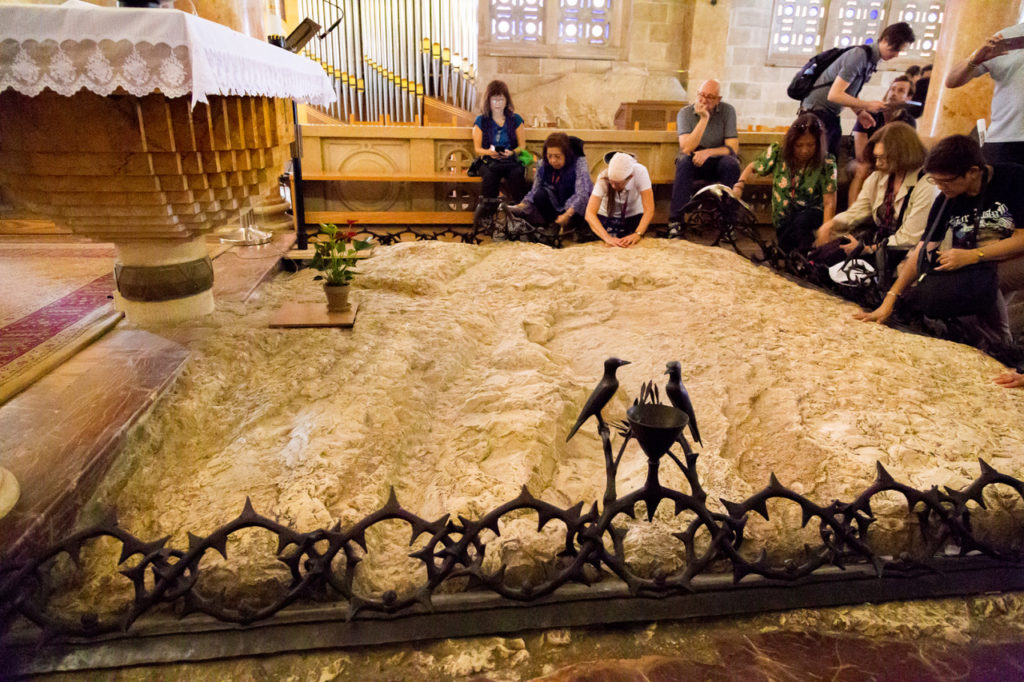
Luke 19: 41-44. The Lament for Jerusalem.41 As he drew near, he saw the city and wept over it, 42saying, “If this day you only knew what makes for peace—but now it is hidden from your eyes. 43 For the days are coming upon you when your enemies will raise a palisade against you; they will encircle you and hem you in on all sides. 44They will smash you to the ground and your children within you, and they will not leave one stone upon another within you because you did not recognize the time of your visitation.”
If you notice this chapel is in honor of dominus flevit, the Latin for ‘The Lord Wept.’ Who wept – the Lord, referring to the sacred name of God revealed in Sinai – the eternal one who has no origin or end, who is the beginning, the middle and the finality of all things.
This is the Lord who wept. This is Jesus of Nazareth.
This chapel is in the shape of an upside-down tear, like the tear that came down from Christ’s face. All the shapes of the ceiling, the arches, the windows, is reminiscent of tears falling down from Jesus’s Holy face. And above on the pillars on the four corners on the ceiling are vases. I interpret that to mean, the collection of our Lord’s tears, just as the angels, would have spiritually collected every drop of His precious blood that came from his sacred humanity during His Passion, so too must the angels have spiritually collected the tears that came from the Holy Face of the incarnate Word of God.
But also, our guardian angels, each collect the tears that we have shed in our pilgrimage of our spiritual life journey, and we know that is not an easy path. The way of the cross is never easy. To follow our Good Shepherd means that we will inevitably have to follow Him in valleys of darkness in order to find new pastures of renewed life in the Lord.
We too will inevitably have to shed tears, whether it’s like Jesus at the tomb of Lazarus, tears that come spontaneously from the times in which we lose a loved one, as Jesus so loved Lazarus; or also like the tears that he shed here – where He suffered tears of rejection and His love was misunderstood. The miscommunication of love, where His love was not accepted, was a source of sorrow for Him.
Anything can make some people cry – a good movie, an emotional experience. Some people can cry very easily. But the tears that come from a movement of the Spirit, whether it’s contrition or compunction, a true sense of sorrow for our sins that doesn’t come from a false guilt, which usually happens because of damaged emotions, a malformed conscience – that’s not the kind of contrition I am talking about.
True repentance is a gift of the Holy Spirit that we call metanoia – a conversion of life. To have the gift of tears that comes from a metanoia experience or a catharsis experience, is to have cleansing, saving tears. That is living water – that’s a gift of the Holy Spirit. To have the gift of tears in this respect is an anointing from heaven that shows salvation is happening in the soul. A baptism is happening in the soul of that person that is coming out in tears. That is a grace of God.
I don’t have that gift. Saint Teresa had the gift of tears. Many monks in the Eastern Church talk about the gift of tears as an expression of metanoia. That’s a wonderful gift. I wish I had it, but I don’t. This gift brings about a new birth; it’s the water of a new birth taking place in the soul, a deeper conversion, a deeper communion with God as a result of our hearts being, as it were, crushed in order to be resurrected.
One thing from the first reading from Isaiah to point out – when our Lord prayed here, He says, ‘Would that you knew what would avail you for peace. I came to bring you peace but you have rejected it.’ As a result you will be the ones to suffer. You will be inviting more problems into your life. I came, not to free you from your problems but to be a medicine to give you the strength to overcome them.

In other words, in Hebrews, Jesus’s presence of salvation doesn’t mean that we will be immune to problems. When Jesus says ‘Follow me,’ He doesn’t say, ‘Follow me and all your problems will go away. You will never experience any suffering.’ That is not His promise. His promise is, ‘I will be with you always; no matter what you go through, it will grow you.’
He will bring all things into subjection into Himself. If He allows it, He can redeem it. He will bring good out of it. He will bring that poison in your life, and turn it into medicine. He will use it for your healing; the very thing that most afflicted you, and that was the greatest cause of your tears, he will use as a cause of your transformation.
This is the promise of salvation. Redemption. Bringing good out of evil. But there’s a time of visitation, he says, a specific time in which He allows the grace to be available to us, and he calls us to not be afraid to enter into that; to not postpone the moment of grace; to not wait until tomorrow; today, to take advantage to receive the grace and His Spirit; today, I ask; today, I allow you to work in my soul.
The prophet Isaiah says, ‘Let my eyes stream with tears over the destruction that overwhelms over the incurable wound of my people.’ He continues, ‘We waited for healing but terror came instead. Why have you struck as a blow that cannot be healed? For your name’s sake spurn us not, remember your covenant with us and break it not. Disgrace not the throne of your glory.’ Isaiah expresses the plea of God’s people in moments that seem insurmountable.
Have you ever found yourself in a situation when the problem seemed so big, that it seemed unresolvable? Of course you have; we all have. We think, ‘There’s no way I’m going to get out of this one; there’s no way I‘ll be able overcome this; there’s no way that God can bring good out of this one; it all ends here.’ These tears are seeds of salvation to bring forth a new harvest of grace in our hearts of God’s presence
This is an expression of the sympathy of God in being able to know our tears, and his angels collect them in a vase as sacred jewels. There is a time of our visitation. The remedy doesn’t happen immediately, but it does happen! It doesn’t happen according to our schedule, our time frame, our expectations, our impatience, or our itinerary. But it does come.
We often have an itinerary of what we propose, but God is the one who disposes. Man proposes, God disposes. In our itinerary of our pilgrimage of life, ‘I propose, God disposes.’
And what God has planned is always better than what we do. And every penance, and every inconvenience along the way, is only part of the greater construction of the final action, the final communion, the final effect of His grace in giving us what we came to look for – God’s face. We see the brightness of this beautiful face after having experienced some kind of brokenness. Passing through the brokenness we come to a new place in what it means to see God’s face.
Every tear is a seed for a harvest. Blessed be God who transforms our crying into dancing, and our mourning into a new anointing. Alleluia.
